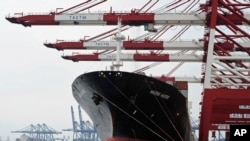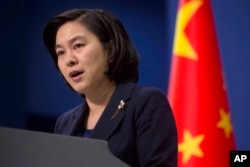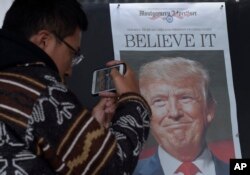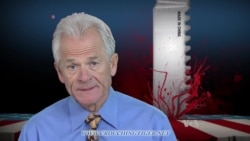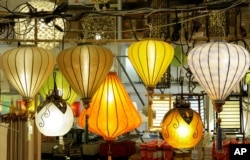President-elect Donald Trump's selection of China critic Peter Navarro as the head of a new White House position focusing on trade is being seen by many in China as confirmation that the Republican leader is determined to implement his election promises to impose trade restrictions on Chinese goods.
Navarro is a business professor at the University of California-Irvine who has been a fierce critic of China's trade and economic policies through books such as "Death by China: Confronting the Dragon — A Global Call to Action," which was also made into a documentary film.
Trump has praised Navarro's books, which accuse China's trade and other policies of harming the American middle class. Trump said he thought Navarro could chart a way to bring back jobs and boost American incomes.
But in China, the pick is being seen as a further sign of what could be a dramatic shift in U.S. policy under a Trump administration.
"Trump's Navarro pick is regarded as a signal that he will take more aggressive actions to promote his American-interests-first agenda. It's likely that the U.S. will adopt reckless trade protectionist policies in the future, causing changes to the pattern of the benefits distribution between the U.S. and other countries," Global Times, the Chinese Communist Party's organ, said in a commentary on its website late Thursday.
The state-run China Daily said Friday “there is a real cause for concern as the president-elect has named Peter Navarro, know for his anti-China alarmism, as his trade adviser.”
Cautious response
The Chinese government itself is being cautious and is reluctant to reveal its plans for possible retaliatory actions.
Responding to a question about the implications of the Navarro appointment, Chinese Foreign Ministry spokeswoman Hua Chunying said Thursday, "I want to emphasize that as major countries, China and the U.S. share a lot of common interests. China wants to maintain sound bilateral trade relations. Mutual cooperation is the right choice for the two countries, and this is beneficial for world peace and development."
Chinese economist Zhang Yunling was more frank about what may lay ahead.
"If Trump imposes high tariffs on Chinese goods, China will surely retaliate," said Zhang, a member of the National Committee of Chinese People's Political Consultative Conference, one of the two houses of the Chinese parliament. "The international system will be in danger if that happens."
Trump named Navarro to head the newly created White House National Trade Council, which the Trump transition team said would "advise the president on innovative strategies in trade negotiations, coordinate with other agencies to assess U.S. manufacturing capabilities and the defense industrial base, and help match unemployed American workers with new opportunities in the skilled manufacturing sector."
Sizable tariff
During the election campaign, Trump promised a tougher stance toward China, vowing he would declare the country a currency manipulator and promising to impose a 45 percent tax on Chinese goods.
Proposals like that threaten to disrupt the U.S.-China trade relationship, and even lead some analysts to question whether a trade war could break out between the world's two largest economies.
Navarro has voiced support for Trump's tough proposals, including the proposed 45 percent tariff, though he and others have also suggested such proposals be viewed as the opening bid in a negotiation.
Harry Kazianis, director of defense studies at the Center for the National Interest, a public policy think tank in Washington, agreed, saying concerns about a trade war were overblown.
"I think what we're all learning when it comes to analyzing President-elect Trump is that a lot of times what he comes out with might be a negotiating position," Kazianis said, adding that Trump might be the type of leader whose statements can't all be taken literally.
However, the Navarro appointment does signal a "fundamental shift in thinking" about China, and an acknowledgement that the U.S. approach in recent decades of focusing on areas of common interest is not working. "I think it's a get-tough-on-China message," Kazianis said.
Trump does not take office until January 20, but Chinese officials said they already had seen signs of a harder-line approach by the Obama administration.
Earlier this month, the Obama administration announced a new challenge over Beijing's trade barriers to importing American rice, wheat and corn. The action at the World Trade Organization alleged that Beijing had structured complex import barriers to harm U.S. farmers. Also, the U.S. trade representative this week put China-based Alibaba Group's online shopping site, Taobao, on the blacklist of "notorious marketplaces" for allowing the sale of counterfeit goods.
Trade imbalance
The U.S. trade deficit with China stood at $42.6 billion in October 2016. Chinese officials think the deficit would give the next president sufficient opportunity to curb Chinese imports.
Chinese officials are also hoping that U.S. companies doing business in China, and connected with Chinese industry in other ways, could try to persuade the new president to soften his stance. Indeed, U.S. companies in China are worried that any drastic action by the new administration could be unsettling for their business.
"American business operating in Asia needs certainty and stability, and the new administration needs to get up to speed quickly on the complex dynamics of the region," James Zimmerman, chairman of the American Chamber of Commerce in China, told VOA.




